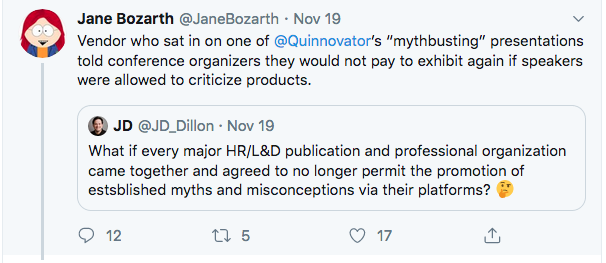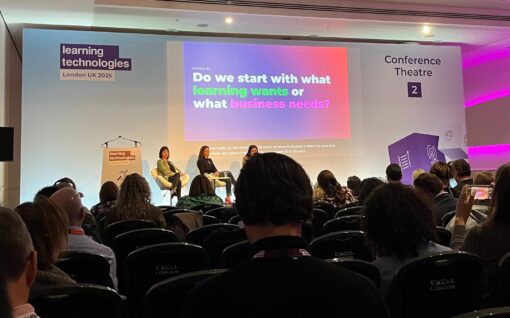Why being better informed in the learning industry is a challenge

The tweet pictured below sparked an interesting conversation about the credibility of information, products and services that are available at corporate learning conferences and exhibitions.

Should conference speakers call out myths that are the basis for products and services on show in the very same event? What responsibility do event organisers have to vet exhibitors based on the provenance of their services? And what of the role of the delegate, the end customer for those vendors pushing services based on out-dated and potentially discredited thinking?
These are timely and pertinent questions. In the UK, we are heading towards a general election and already misinformation is being spread. The same thing happened in the Brexit vote in 2016. Misinformation is at play in dozens of countries around the world. As corporate consumers, this is our context. Misinformation is a challenge in public life.
When it comes to buying products and services in the B2B arena, the best purchases will be made on informed decisions. The type of information that would be useful for informing prospective clients includes:
- Customer testimony
- Evidence of impact
- Market insights and context – where you sit in the market
- Supporting evidence and data
- Clear examples of how the prooduct/service is used in different contexts to solve real business challenges
- Examples of the organisations you work with
- Clear evidence of your expertise
Having this type of information positions vendors as credible. This type of information serves to educate customers about what they do, where they fit in the market – which is increasingly important in the learning technology ecosystem – and what type of impact they have in organisations.
However, as most vendors will tell you, it can be very difficult to get the kind of customer testimony and evidence of success that would be useful to share with the market. Organisations can be very guarded about talking up suppliers. This is not at all helpful for supporting customers with information to help them make informed decisions.
There is one exception to this and that is award entries. If there is a sniff of a chance to win an award then vendors and customers seem able to work together to share some useful insights on how the technology has benefitted the end user. That said, my experience of judging awards tells me that impact data can be thin on the ground. And where would you go if you wanted to access the award entries to find information that might help you make informed decisions? There is no place to go because this information is not made publicly available. The version of the entry you will see will be the winner’s case study. They can be useful but they tend to omit impact data and contextual information that shows the type of application of a product that works best.
And then there is the broader challenge of customer education. Digital, in particular, is a challenge for many learning teams and their organisation (L&D teams are not alone here – all business functions are grappling with this). A part of the challenge is a limited understanding of the learning technology market. This requires learning professionals to seek out market intelligence from wherever they can find it. And that brings us back to vendors, who become an important part of the learning technology education process. At this point we are in a vicious cycle of vendors and customers not sharing the right kind of information that can help educate the market and make informed decisions.
So what’s the answer?
Bravery. For vendors, this is about breaking out of the current marketing and information cycle. It’s about making easily accessible the types of information listed above.
Curiosity and challenge. For L&D professionals, this is about education. Understanding learning, understanding business needs and understanding the type of technology that will best suit your organisation’s needs. Take that into conversations with vendors and see where the conversation takes you.
Transparency and credibility. For all media outlets and professional institutes and anyone else in the business of educating L&D professionals, the focus needs to be on creating, curating and sharing credible information. We need to raise the quality of information that we rely on to make purchasing decisions.
And for event organisers, there is a whole world of opportunity, both in the speakers you choose and the way you use their insights to support exhibitors. No event should be a parallel universe with conference speakers saying one thing and exhibitors saying something completely different.
We need better information to make better informed decisions. We all have a duty to play our part in that.

